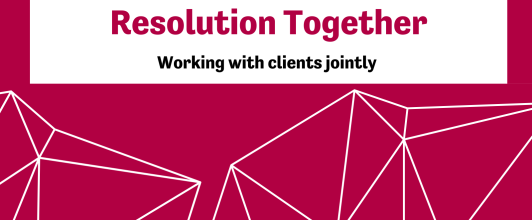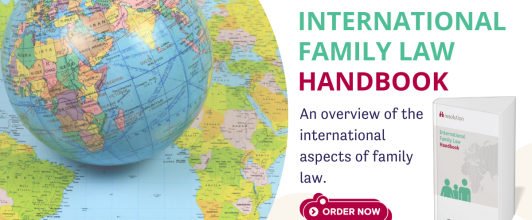
The Review
The Review is Resolution's bi-monthly magazine for members. Publishing six times a year with a mix of features, law and practice and news from the regions.
Broad range of information for professionals and practitioners in family law and justice.
Showing 301 - 320 of 518

The Review is Resolution's bi-monthly magazine for members. Publishing six times a year with a mix of features, law and practice and news from the regions.

Resonate is a new blog from Resolution, bringing together voices from across family law to share insight, experience and both personal and professional perspectives
As part of Resolution's Code of Practice members are asked to use the Good Practice Guides as part of their day to day work. These represent Resolution's core values and are designed to offer knowledge and guidance to our members.

Resolution Together is a way of working that allows lawyers to work with and advise couples jointly, including providing appropriate legal advice, through a divorce or separation.

Find resources on mediation, collaborative practice, arbitration and more.

This list of recommendations of family lawyers in other jurisdictions has been compiled by the members of Resolution's International Committee based on their working experience. The lawyers on this list are not Resolution members - unless indicated - and as such are not endorsed or recommended by Resolution.
The fallout from the controversial judgment in F v H and what it will mean for judicial training. In this article for The Review Anna-Laura Lock and Selena Arbe-Barnes take a look at this new situation.
Is the Domestic Abuse Bill the rescue craft sought by the family justice system? This article for The Review takes a look at it.
With so many people’s financial positions likely to change suddenly, what are the chances of setting aside or varying an order made in more stable times?
With the global economic markets in turmoil, valuations being undermined immediately, many businesses on the edge of an abyss, the housing market effectively frozen and widespread furlough leave and redundancies, there cannot be a more difficult time for financial remedy practitioners to advise clients on the merits (or not) of pursuing or settling financial claims.
With Covid-19 shifting cases overnight to digital-only, there is an urgent need to consider transparency issues, as well as ensuring our clients are not being left behind in the new processes.
On 17 March 2020 the Family Division noted in a statement that “there is an urgent need to increase the use of telephone and video technology immediately to hold remote hearings where possible. Emergency legislation is being drafted which is likely to contain clauses that expand the powers in criminal courts to use technology in a wider range of hearings. The Civil Procedure Rules and Family Procedure Rules provide for considerable flexibility. We also encourage you to work with your local court staff to identify work which could be done from home.”
Changes to the financial remedy courts that had been planned before readers had heard of Covid-19 may turn out to have been quite spectacularly well-timed…
This article tries to answer some of the questions now faced by separated parents worried about how the current events and government advice will impact on their child arrangements – whether existing or sought. I have seen and read many social media comments about this topic. There seems to be a wide divergence of views from family lawyers up and down the country.
The Covid-19 lockdown is an incredibly dangerous time for survivors of domestic abuse. It has been widely reported that domestic abuse organisations have seen a huge increase in contact since the lockdown began. Refuge, for example, has reported an increase of online traffic to its National Domestic Abuse Helpline of 700%. Following media coverage of the helpline, calls and logs on 6 April 2020 were up by 120% compared to the previous day.
As family practitioners make a first set of emergency responses to the Covid pandemic, here are some pointers to the main issues and some sources of guidance.
During this global pandemic we are all having to operate in new ways and really understand the pressures and situations that people are facing. For those of you with Muslim colleagues and clients the period of Ramadan starts on the 23rd or 24th of April and lasts for either 29 or 30 days. With the current pandemic this may cause additional pressures for them so this article will provide you with more information in order to support them.
We bring together a selection of digital resources and learning materials that can be accessed to learn at home.
Adele Ballantyne, Director of Eleda Consultancy and Marcie Shaoul Director of Rolling Stone Coaching have come together to talk about how to effectively build online relationships with clients.
Resolution's Coronavirus email bulletin is published twice weekly on a Tuesday and Friday.
The information gathering application for family lawyers has extended its capacity into a number of new client types.
First let’s recap: for those who aren’t aware, Engage is a web application that helps prospective clients, in their own time, put together all the information a family lawyer requires ahead of a first meeting – ensuring bespoke advice can be given at that first meeting. Engage enhances the initial consultation for both the family lawyer, as they have all the facts, and for the client, as they feel prepared and informed ahead of the meeting.
An invitation to the Spanish courts provided one Resolution member – and member of the international committee – with an excellent opportunity to survey the main differences between Spanish and English & Welsh family law.
Following Re TT in the last issue, we now have P (Transgender applicant for declaration of valid marriage) [2019]: a cautionary tale to ensure that a gender recognition certificate is obtained.
How different are the outcomes for unmarried individuals in Scotland and England? To look at some of the headline differences, lawyers from each side of the border follow a couple who decide not to marry and who have connections north and south.
With the courts increasingly needing to establish historical values, robust accountancy approaches are required – but with active and passive growth, the springboard effect, and the general concept of fairness all in play, there is seldom one clear answer.
In the first of a two-part article in The Review on the modern law of pre-nups, we look back on the Supreme Court decision in Radmacher and consider how best practice has evolved in this area.